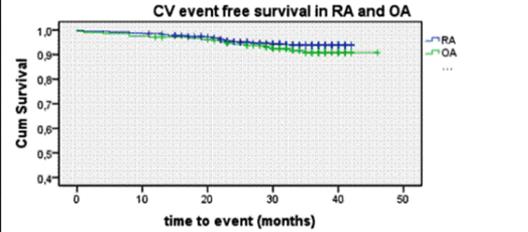Session Information
Session Type: Abstract Submissions (ACR)
Background/Purpose:
Rheumatoid arthritis (RA) is associated with increased cardiovascular (CV) morbidity and mortality. This association is thought to be due to the chronic inflammatory disease process, clustering of lifestyle associated CV risk factors, as well as the use of medication such as non steroidal anti-inflammatory drugs (NSAIDs) and corticosteroids in patients with RA. Most studies on CV risk in patients with RA were performed before the introduction of modern powerful anti-inflammatory therapies and intensive treatment strategies aiming at remission. It is important to obtain more information on CV risk in intensively treated RA.
The objective of this study was to evaluate CV event risk and its predictors in intensively treated RA in comparison with an OA population.
Methods:
first prospective analysis of occurrence of CV events (myocardial infarction, acute coronary syndrome, coronary intervention, acute heart failure, acute cardiac death) in a cohort of consecutive patients attending the Arthritis Centre Twente (ACT-CVD). All patients with a diagnosis of RA (n=495) or OA (n=208) without previous CV events were included in this study. Inclusion took place between February 2009 and November 2011, follow up data for this analysis were collected onto November 2012. Incidence of CV events in RA and OA groups was compared by Kaplan Meier survival analysis, potential CV event risk factors (traditional CV risk factors and RA severity markers) within groups were evaluated by COX-regression.
Results:
At baseline RA and OA groups did not differ in sex (% female; RA=72, OA=78), age (mean years; RA=59, OA=59) and estimated 10-year risk of CV death (mean %; RA=5.7, OA=5.5). The RA group (mean disease duration 7.5 years, 50 % RF positive) was characterized by low disease activity (mean DAS28 2.5, 72% remission). After a median follow up of 36 months 46 events had occurred (RA=29, OA=17, p=0.25, figure 1). Age, systolic blood pressure and non-use of methotrexate significantly contributed to CV event risk in RA, age and current smoking in OA.
Conclusion:
Preliminary data suggest that CV event risk in intensively treated RA equals CV event risk in OA. Use of methotrexate is independently associated with lower CV event incidence in RA.
Disclosure:
I. L. Meek,
None;
H. E. Vonkeman,
None;
M. A. F. J. van de Laar,
None.
« Back to 2013 ACR/ARHP Annual Meeting
ACR Meeting Abstracts - https://acrabstracts.org/abstract/cardiovascular-risk-in-intensively-treated-rheumatoid-arthritis-comparison-to-an-osteoarthritis-population-first-prospective-analysis-of-the-act-cvd-cohort/

